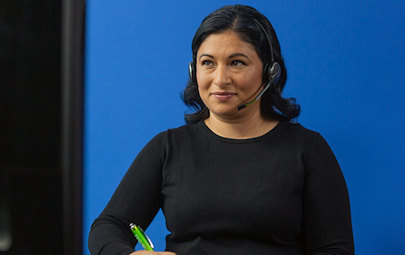
What to Expect in Your Early Years as an ASL Interpreter
Starting your career as a professional ASL interpreter is exciting and challenging. After years of training, mentorship, and certification, you're ready to engage in real-world settings. This guide walks you through experiences, challenges, and opportunities for new ASL medical interpreters.
What to Expect from Your First Sessions
Your first few year will likely involve a steep learning curve. Even with Deaf community engagement and solid training, interpreting in professional environments presents unique challenges you haven't encountered in the classroom and social settings.
Healthcare interpreting requires specialized knowledge and sensitivity. You'll encounter medical terminology, emotional situations, and time-sensitive communications that demand both technical skills and emotional resilience. Many new interpreters find their first emergency room or surgery consultation overwhelming, but this is completely normal. Taking personal accountability, to screen and accept assignments you are qualified for and have ample support as a newer interpreter are key!
Contract vs. Staff Positions
Some new interpreters start with contract work with agencies in their area, which offers flexibility while you build experience. Some organizations provide both independent contract, part time, and full-time opportunities for ASL interpreters, allowing you to choose the path that fits your experience, skill set and career goals. As a newer interpreter, working within a team of experienced interpreters and Certified Deaf Interpreters is especially critical, and should help guide your employment and assignment choices whether you choose to work as an independent contractor or employee/team member.
Contract positions often provide:
- Flexible scheduling
- Exposure to different healthcare facilities
- Opportunity to build a diverse skill set
- Higher hourly rates in some cases
Full-time positions typically offer:
- Steady income and benefits
- Stronger relationships with healthcare teams
- Deeper relationships and teaming opportunities with ASL interpreters (hearing and Deaf)
- More predictable schedules
- Professional development opportunities
Building Your Professional Skills
Technical Competencies
While interpreters are committed to life-long learning and continuously honing their craft, your first few years focus heavily on refining core interpreting skills. You'll work on:
- Consecutive Interpreting: Medical appointments involve critical communication exchanges between patient and provider. You'll need to accurately convey complex medical information in both directions. Use of consecutive interpreting is most common and best supports accuracy and thorough messages, more readily understood than a faster paced simultaneous interpreting approach.
- Simultaneous Interpreting: Some situations, like group therapy sessions or medical procedures, require real-time interpretation while events unfold.
- Sight Translation: A patient may need support with understanding Reading medical forms that are not in their first language. Discharge instructions, or consent forms are often read aloud and are interpreted. Interpreters may also engage in sight translation, directly from the forms provided when appropriate concentration.
- Cointerpreting with CDIs: Co-interpreting, which pairs an ASL interpreter with a Certified Deaf Interpreter (CDI), goes beyond the traditional model and provides optimal access. It’s an equal collaboration where both interpreters bring unique skills to enhance communication. CDIs provide much needed cultural insights and language intuition, especially during complex, high-context interactions.
Cultural Mediation & Ethical Decision Making
Beyond language translation, you'll serve as a cultural bridge and make ethical decisions within your scope of practice. This requires care and attention to communication norms & nuances, the goal of the session/interaction, and identifying gaps that may exist due to the difference in language, culture, and shared experience between all parties.
Healthcare providers often have limited understanding of Deaf culture perspectives on medical care, privacy, and communication preferences. When interpreters recognize a “gap” they partner with patients and providers to ensure it is clearly communicated and addressed. Engaging in reflective practices and case consultations with colleagues can help you become adept at making effective, real-time decisions relative to cultural mediation.
Job Opportunities in Your First Year
ASL Interpreter Jobs in Healthcare
Healthcare remains the largest employment sector for ASL interpreters. Medical interpreter jobs offer steady work and competitive compensation, with opportunities in:
- Hospitals and emergency rooms
- Outpatient clinics
- Mental health facilities
- Physical therapy and rehabilitation centers
- Telehealth platforms
Companies like AMN Healthcare actively recruit interpreters, providing training and support to help you succeed in medical settings.
Educational Settings
Many interpreters also work in educational environments, from elementary schools to universities. These positions often offer regular schedules and long-term relationships with students.
Community Interpreting
There are additional opportunities to diversify your experience and skill set outside of specialized fields like healthcare and education. Interpreters are often in job interviews, government meetings, employment training, informational sessions/meetings, business meetings, and community events, to name just a few.

Challenges You'll Face
Emotional Demands
Healthcare interpreting involves difficult conversations about diagnoses, treatment options, and end-of-life care. Your first few years will test your emotional resilience and professional boundaries.
Self-Care Strategies:
- Develop debriefing routines after challenging assignments
- Connect with experienced interpreters for mentorship
- Consider professional counseling if needed
- Maintain clear boundaries between work and personal life
Technical Challenges
Medical terminology, legal jargon, and specialized vocabulary require ongoing study. Expect to spend significant time outside work hours learning new terminology and concepts.
Scheduling and Logistics
Coordinating multiple assignments, travel time, and cancellations becomes a skill. Many new interpreters underestimate the administrative aspects of the job.
Professional Development and Growth
Continuing Education
Your learning doesn't stop after certification. Interpreters engage in continuing education and should prioritize:
- Medical interpreting workshops
- Specialty certification programs of interest
- Professional conferences and networking events
- Online and in-person training modules relevant to their work and topics of interest
Building Professional Networks
Connecting with other interpreters, healthcare professionals, and Deaf community members creates opportunities for referrals and career advancement.
Performance Feedback
Seek feedback from clients, supervisors, and Deaf consumers. This input helps identify areas for improvement and builds confidence in your abilities.
Financial Expectations
First-year interpreters typically earn between $25-40 per hour, depending on location, setting, and experience level. Healthcare interpreting often commands higher rates due to specialized knowledge requirements.
Factors Affecting Compensation:
- Geographic location
- Type of healthcare facility
- Hours worked (contract vs. full-time)
- Specialized certifications
- Emergency or after-hours availability
Tips for Success
Prepare Thoroughly
Research facilities, medical procedures, and terminology before assignments. This preparation reduces stress and improves performance.
Communicate Professionally
Build relationships with healthcare staff by being reliable, professional, and educating them about working with interpreters when appropriate.
Stay Current
Medical practices and terminology evolve constantly. Subscribe to medical interpreting publications and participate in professional development opportunities.
Know Your Limits
It's okay to request team interpreting for complex or lengthy procedures. Recognizing when you need support shows professionalism, not weakness.
Looking Ahead
Your first years lay the foundation for long-term career success. Many interpreters find their confidence and skills improve dramatically as they gain real-world experience and continue to actively engage in the Deaf community and with other professional interpreters.
Career Advancement Opportunities:
- Specialization in specific medical fields
- Leadership roles in interpreter services
- Training and mentoring new interpreters
- Freelance consulting for healthcare organizations
Start Your ASL Interpreting Career Today
Your first few years as an ASL interpreter will be both challenging and rewarding, especially in growing fields like healthcare where communication saves lives. Organizations like AMN Healthcare provide training, mentorship, and resources to help new interpreters succeed. Ready to start your career? Explore ASL and medical interpreter jobs today and make a meaningful impact.



